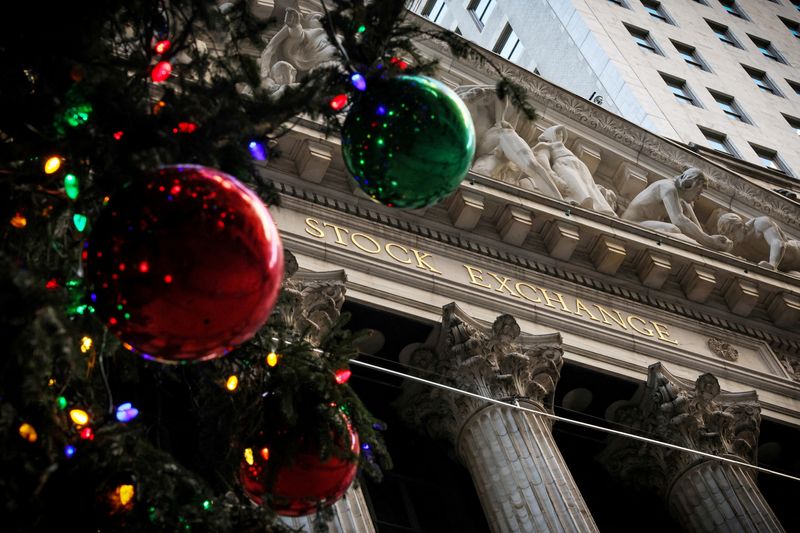By Lewis Krauskopf
NEW YORK (Reuters) - Wall Street is counting on the so-called Santa Claus Rally to bring record highs as markets close out 2023 with strong gains.
The S&P 500 is up over 4% in December alone and has risen 24% this year, bringing it within 1% of a new all-time high. The benchmark index is also on track for its eighth straight positive week.
If history is any indication, that momentum is likely to continue in the short-term. The end of the year tends to be a strong period for stocks, a phenomenon dubbed the “Santa Claus Rally.”
The S&P 500 on average has gained 1.3% in the last five days of December and first two days of January, according to data from the Stock Trader's Almanac going back to 1969. Those gains have been pinned on reasons varying from buying before the new year following tax-related sales to general holiday hopefulness.
This year, optimism is high. The Federal Reserve surprised investors earlier in December by signaling that its historic monetary policy tightening is likely over and projecting rate cuts into 2024, following signs that inflation is continuing to moderate. Data on Friday supported that trend, showing annual U.S. inflation - as measured by the personal consumption expenditures (PCE) price index - slowed further below 3% in November.
“The narrative will continue to be about the Fed making a dovish pivot,” said Angelo Kourkafas, senior investment strategist at Edward Jones. “That provides support on markets and sentiment and that is unlikely to change next week.”
Investors have lately demonstrated a hearty appetite for stocks. BofA clients bought $6.4 billion of U.S. equities on a net basis in the latest week, the largest weekly net inflow since October 2022, BofA Global Research said in a Dec. 19 report.
Meanwhile, there has been a "sharp increase" in buying among retail investors over the past four to six weeks, Vanda (NASDAQ:VNDA) Research said in a note on Wednesday.
"After having chased higher yields aggressively in the past months, the FOMC pivot and strengthening soft-landing narrative have had individuals redirecting their purchases toward riskier securities," Vanda said in a note. "We expect this trend to continue into the new year as yields remain under pressure."
Citing confirmation from gauges that measure stock market breadth, Ned Davis Research this week recommended investors shift a further 5% from cash to equities, bringing its equity allocation up to its maximum amount in its portfolio models.
To be sure, trading volumes are expected to be thin for the remainder of the year as investors take holiday breaks, leaving stocks particularly sensitive to unexpected news or large trades.
One example of outsized moves came earlier this week, when the S&P 500 took an abrupt turn lower on Wednesday afternoon and closed down 1.5% on the day. Some market participants attributed the move to a combination of low volumes, activity in zero-day options and trades by institutional investors, after an extended period of gains for stocks.

At the same time, investors heavy in cash could seek to buy into the market next week because of "fear of missing out" on the equity rally, often referred to as "FOMO," said Kevin Mahn, president and chief investment officer at Hennion & Walsh Asset Management.
"I think the markets have gotten a little ahead of themselves based upon the extent of the rally so far," Mahn said. "But I could see the market moving up slightly higher ... from here just because of that FOMO trade."